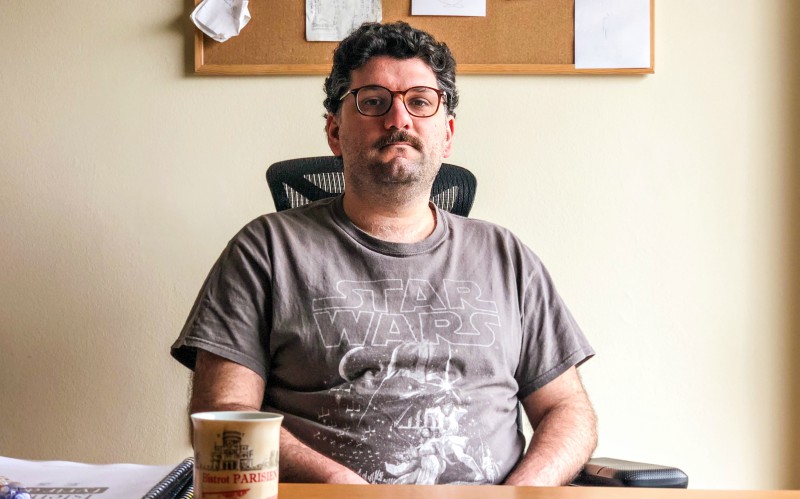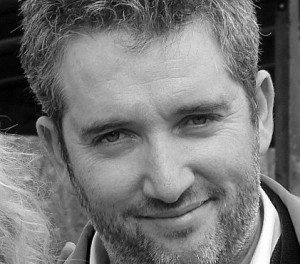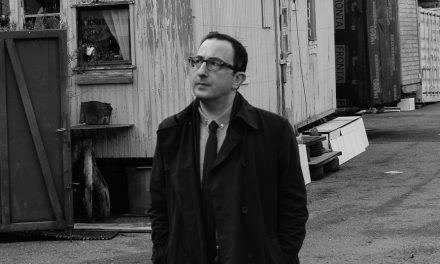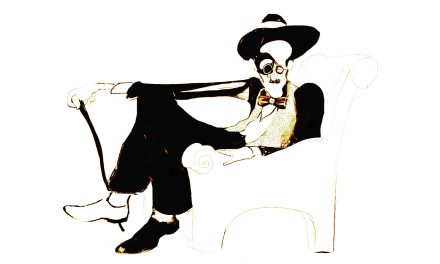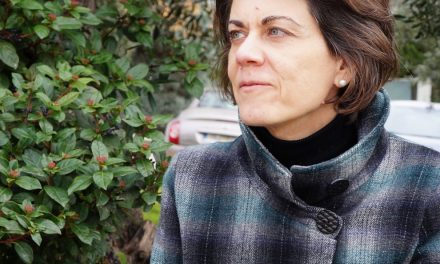Dimosthenis Papamarkos is a novel and short story writer and screenwriter. Born in Malesina, Phthiotis in 1983, he wrote and published his first work, the novel The Silicon Brotherhood at the age of 15. His collection of short stories titled Gkiak took the Greek reading audience by storm in 2014 with the way he approached themes regarding the lives of Greek Soldiers returning home from the Greco-Turkish War of 1919-1922; the work was praised for its realistic characters and its meticulous use of the language of the time, granting him the Petros Haris Foundation / Academy of Athens award. Gkiak also won the award for best short novel by O Anagnostis magazine in 2015, and was adapted for the stage with great success.
Papamarkos’ works also include the novel The fourth knight (2001) and the short story collection ΜεταΠοίηση (2015), while one of his most interesting projects is the graphic novel adaptation of Kornaros’ Erotokritos, alongside Giorgos Goussis and Giannis Ragos (translated into English by B. Walter, 2016). He also wrote the libretto for a musical theatre adaptation of Aristophanes’ Peace staged by the National Theatre of Greece (2017), and co-wrote the screenplay for Yannis Economides forthcoming film The ballad of a pierced heart. Papamarkos is PhD Candidate of Ancient Greek History in the Oxford University and is the first Greek writer commissioned to write a play for the Οnassis Cultural Centre of Athens.
Dimosthenis Papamarkos spoke to Reading Greece* about his creative process, his experience working on a graphic novel adaptation of a classic work such as Erotokritos, his thoughts on the digital era’s impact on literature and his hopes about the future of Greek literature.
Gkiak has been a breakthrough work, widely acclaimed, with stories from the collection translated into English, French and Russian. To what degree did the crisis affect its reception?
Interesting question. I’ve never really thought about it to tell you the truth. Certainly, the way a book is received is also product of the circumstances of that particular point in time it reaches its audience. In the case of Gkiak, the book does come amid the crisis, but I have never thought about how this has affected its readers.
The Minister for Culture and Sports, Mirsini Zorba, has designated 2019 as the year of Erotokritos. What was the experience like to work on the creation of a graphic novel, especially on such a momentous, historical literary work as Erotokritos by Vitsentzos Kornaros?
This is one of the most enjoyable things I have ever done, and generally speaking, working on a graphic novel is something I enjoy very much as it essentially consists of team work; hence, if there is chemistry in the collaboration it is wonderful, meeting as such my need to witness another medium of narration in the making – in this case, images – and how it works when combined with the medium of narration I mainly work with, namely words. This is where surprising things may occur, including the delight of coming across and learning something new, which becomes a rarity as we get older. That was very much the case with the work on Erotokritos, whilst for the first time I was put in a position where I had to closely examine the original work and study it in a more disciplined and rigorous manner. Moreover, together with co-writer Giannis Ragos, we had to think and decide what we could keep from the original work for the graphic novel, i.e. which elements of Erotokritos could possibly be “transformed” and be included in a graphic novel and what could be done with the language; this may all sound like drudgery but it is in fact a process of dialogue with the original work. It is a very meaningful dialogue, because in a sense you are talking with yourself, reading something you thought you knew and in the process you learn something more, shedding light from many different angles and finally, you have the pleasure of being able to play with something you love very much which, up until that point, you couldn’t really do. I mean, Erotokritos is an established, complete work out there, and no matter how much you want to play around with it, you can’t, thus the only way you could do this is by adapting it into something else, in this case into a graphic novel.
There was an additional factor for me in all this, because, in a way, I conducted the historical documentation for the graphic novel, which may be fiction, but several elements were based on Greek history, thus I was tasked with relevant research so to speak. I had to e.g., find Byzantine gowns because Giorgos Goussis, who did the sketching, chose to portray the court of King Heracles as byzantine, or work out with Goussis how the Athenians’ armor would be, suggesting for example that they look a bit more western, adding the owl pattern etc. I also researched how the battles would be depicted, the duels etc, as every action related to battle and its choreography are based on original medieval textbooks that show, for instance, how to fight when your opponent’s weapon is a knife and yours is a sword or the other way around. It was an enjoyable experience.
You have in the past referred to your interest in game design and video game script in general. How do story-telling or story-driven video games stand in relation to contemporary forms of discourse, and do they constitute a powerful means of storytelling given their interactive character (such as the element of plot turns and alternate endings based on player in game decisions)?
I haven’t been able to follow this up as much as I would like on account of work. Plot turns and alternate endings based on player decisions were there in the past as well. In fact, the older the game, the more text narrativethere is, with the main difference being that back then there was only text, while nowadays there is sound and speech. For me it is a great new field for exploring what storytelling really means and it’s not necessarily mainstream and trivial, meaning that we shouldn’t say “it doesn’t compare to a good book”. Sometimes a video game might not be Moby Dick level of storytelling for example, but it could be like a really good book in terms of creativity, imaginative story set-up and development. Therefore, if you have good scriptwriters, then I don’t see why you can’t have good stories – they are simply in another field. Likewise, we don’t think of a movie as better or worse than a book. If we must however compare them in any way, I would say that a video game is like a very good book, while someone with different experiences to mine, who has grown up playing video games, might tell you that it is better than a book. It’s possible.
Nevertheless, I am not of the opinion that video games are for kids and I think that we could learn a lot from the way a fascinating story is narrated while playing a well-made video game. And of course, where imagination comes into play is relevant, because in books you paint the picture yourself while in video games it is already there for you. But as we said earlier, the possibility for interaction is a different aspect of what I can do with my imagination and how I can picture and enter this world, feel the atmosphere and finally get its point. I find it intricate and challenging, definitely not something to be rejected just like that. Some might say that there are not so many good games out there, which may be a point, but in future we may have more good video games as the industry develops. But good video games are truly good.
Having already talked about modern forms of narration and expression, we cannot ignore the issue of the “Digital era”; e-books, audio books, blogs, social media …Has the digital era influenced Greek literature?
I cannot really claim to have so much of a general overview of Greek literature and of the digital world on the whole in order to answer this. I would instinctively say that it has, given that literature could not be exempt from the effects of the digital era in so many fields, especially in social media, where prose evolves into instant miniature stories or poetry explodes on screen. Additionally, the fact that you are able to instantly publish what you have written surely in the end affects the way you write, whilst getting feedback directly is instant gratification for every writer’s need to witness his work being read. Hence the digital era has certainly changed the way we perceive literary works. As far as e-books and audio books are concerned, we can’t say that they are here for us just yet (in Greece): very rarely will you find Greek e-books and even more so audio books. I also don’t believe that anyone, even abroad, writes having these formats in mind. In a way, if you think about it, ebooks are a digital imitation of the printed book; in other words, they have not brought about a new way of reading.
You still turn pages but you merely get to choose fonts, character size and whether the screen will be white or sepia. Social media and the web as a whole are instant-posting platforms but texts need to be kept brief. A 2000 word interview is something you could read, it would be a two-page affair in a newspaper for example, but you would not read it on the web, as it would appear too long. There are online magazines where it is difficult to publish a 5000 word text. And then there are the aesthetics of the plain and simple, but that’s another topic of discussion.
Trying to get inside the writer’s head: what simple and ordinary event could constitute source of creative inspiration?
I can only speak for myself because different people will tell you different things. For me, there is no such thing as specific events that move me or that it is e.g., more likely to find inspiration during a walk in the park instead of in the city centre. What is usually the case consists of some preexisting emotional and mental state rendering me more receptive and responsive to events concerning this particular situation.
In other words if there is some idea or issue in my mind – death for example – and I am in the process of thinking how to approach the subject, whether literarily or not, then I will surely become more aware of a funeral scene with a hearse going by, or a woman lamenting the loss of her husband or even someone holding a photo of somebody close to him and looking at it; these are images which will connect with the theme I’m working on. So, while I will see everything around me, it is only some observations that will open up a whole universe with a multitude of references. If you are preoccupied and stressed out then you do not observe at all or observe rarely; you need to come out somewhat empty, open, and that is when you pay attention.
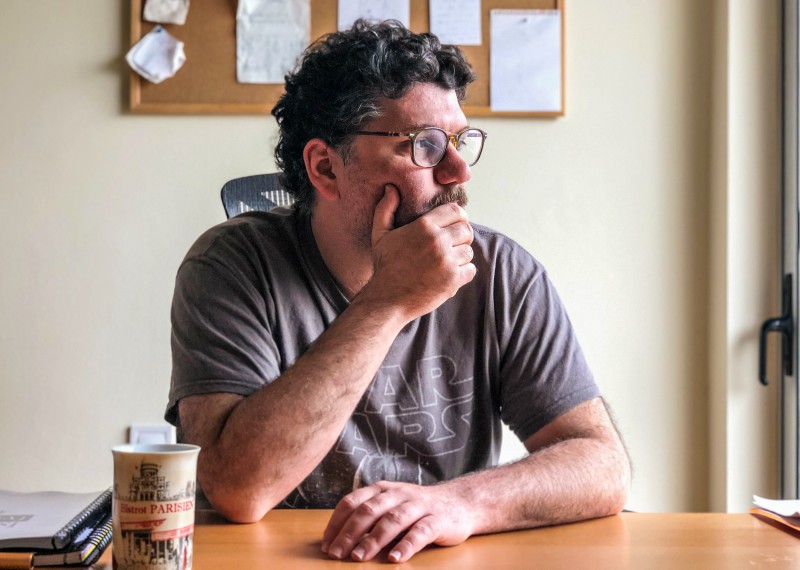 So, having decided on the theme and whilst actively observing, do you decide there and then that you’ll begin writing? What is the creative process?
So, having decided on the theme and whilst actively observing, do you decide there and then that you’ll begin writing? What is the creative process?
To begin with, it is about how this idea that I have develops and how all possibilities are explored: how and why something must be said and whether it is possible to say it differently; what does each alternative offer and what holes does it leave in my story? Are there logical steps in plot build-up? How have I described the main character? When all these are settled in some way, not necessarily in every detail and I place them in order, I then settle down to the process of writing, which is head on down to the end until the story is finished. This of course has been possible thus far as I have been writing short-stories, where you can do in a day let’s say 16 hours and finish it. It is another story when it comes to something longer.
That is to say, in order to write a novel or a novella you have to stop writing at some point and return to it later. To sum up, the process of writing for me is having an idea and exploring it for the story, doing plenty of research if necessary for what I plan to write about, and when I have all this in order in my mind do I then begin to write. I do it this way because I don’t like breaking my rhythm in order to stop and look up things or wonder about story development. I want my options laid out, so that even if I end up somewhere different from where I had decided that I will not be caught by surprise and thrown off course.
What would you want the future of Greek literature to ideally look like in terms of both form and content?
As a reader of Greek literature, I can say that I feel quite content reading only modern Greek works. We have great writers and many new ones take the stage with very interesting voices and new ways of approaching themes and literature itself, so you have both classic and modern works and the interest is high. If I miss something in Greek literature, then that would be genre literature, which is unfortunately regarded as lowbrow in Greece, and thus we are short in this field. There is also the problem that if a work belongs to the horror genre, then it can’t be good. We have to justify it as we do in films and admit that “it may be a horror movie but it is also good”.
Why does the one have to be independent of the other? I would therefore like for more works of the fantasy, sci-fi, and horror genre out there and with different standards – meaning that because it is still viewed as an art form in want of artistic or intellectual value, no serious effort is being made in creating such works. If a horror fiction work is received by publishers it will be treated with different criteria than mainstream literary works, where criteria are stricter. Consequently, what I would like is to see this gap filled, and not only so that we don’t consume imports – the richer the field from other cultures, the better – but because I truly believe that we have abundant and unexplored material that could be used, it’s a shame that we have not caught on as yet.
What’s next for you in the foreseeable future?
I am working on two plays: one of them is within my role as writer in residence for the Onassis Foundation, which is set to be complete early 2020; the second one is a surprise. I am also working as a content creator on a television project concerning a horror series for Faliro House Productions, as well as on Gimna Osta (Naked Bones), a horror/sci-fi graphic novel, which is almost finished. I also have an idea for a literary work for which I am trying to find the time to start writing. Lastly, I am currently working as drama consultant for the National Theatre of Greece production of Aeschylus’ The Eumenides, directed by Georgia Mavragani, to be staged in Epidavros this summer.
*Interview by Giannis Koutsoukos. Translation into English by Magda Hatzopoulou.
Read also via Greek News Agenda: Riikka Pulkkinen on Greek Literature in Finland; Vangelis Hatzivassileiou on the Individual and Society in Modern Greek Fiction 1974-2017; Reading Greece: Yannis Goranitis on Athens as an Inspiring Literary City; Vangelis Hatziyannidis: “Writing for an opera was like a puzzle I really enjoyed”

